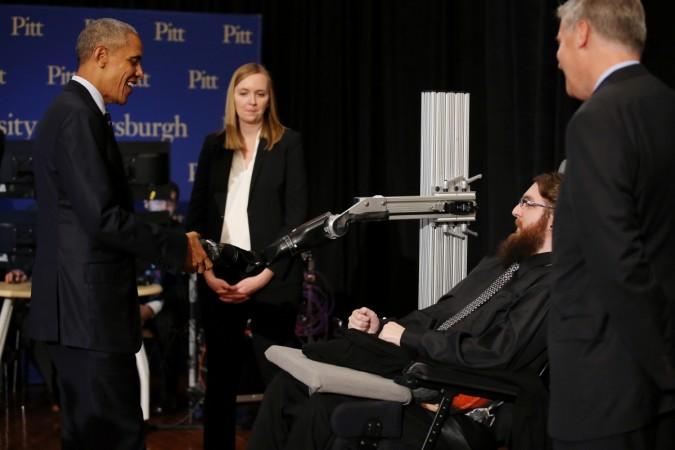
Nathan Copeland, 28, who suffered from paralysis caused by a car accident, regained his senses with the help of a brain chip which is referred to as Brain Computer Interface (BCI).
Researchers at the University of Pittsburgh and the University of Pittsburgh Medical Center (UPMC) devised the BCI. This amazing technology aids Copeland in experiencing touch sensations with the help of a robotic hand, which his brain controls.
"The most important result in this study is that micro-stimulation of sensory cortex can elicit natural sensation instead of tingling," said study co-author Andrew B Schwartz.
"This stimulation is safe, and the evoked sensations are stable over months. There is still a lot of research that needs to be carried out to better understand the stimulation patterns needed to help patients make better movements," he added.
Copeland met with a car accident in 2004, when he was 18. He suffered from serious injuries which damaged his spinal cord and even snapped his neck. Copeland got paralysed from the upper chest, the sensitivity of his lower arms and legs could no longer be felt by him. He had to let go of his studies due to the health issues.
He got himself enrolled in the Pitt's registry of patients and participated in numerous clinical trials. He got a chance to participate in an experimental study around a decade later.
The exact region in Copeland's brain which corresponded to feelings in his palm and in each of his fingers was identified by the researchers through imaging techniques. He was then operated and four shirt button-sized tiny microelectrodes were implanted in his brain by Elizabeth Tyler-Kabara, study co-investigator and UPMC neurosurgeon.
"I can feel just about every finger—it's a really weird sensation," Copeland said about a month post surgery.
"Sometimes it feels electrical and sometimes its pressure, but for the most part, I can tell most of the fingers with definite precision. It feels like my fingers are getting touched or pushed," he added.
US President Barack Obama shook hands with Copeland at the White House Frontiers conference in Pittsburgh on Thursday, October 13, during a tour of the innovation projects.
"The ultimate goal is to create a system which moves and feels just like a natural arm would," said lead researcher Dr Gaunt. "We have a long way to go to get there, but this is a great start," he added.














